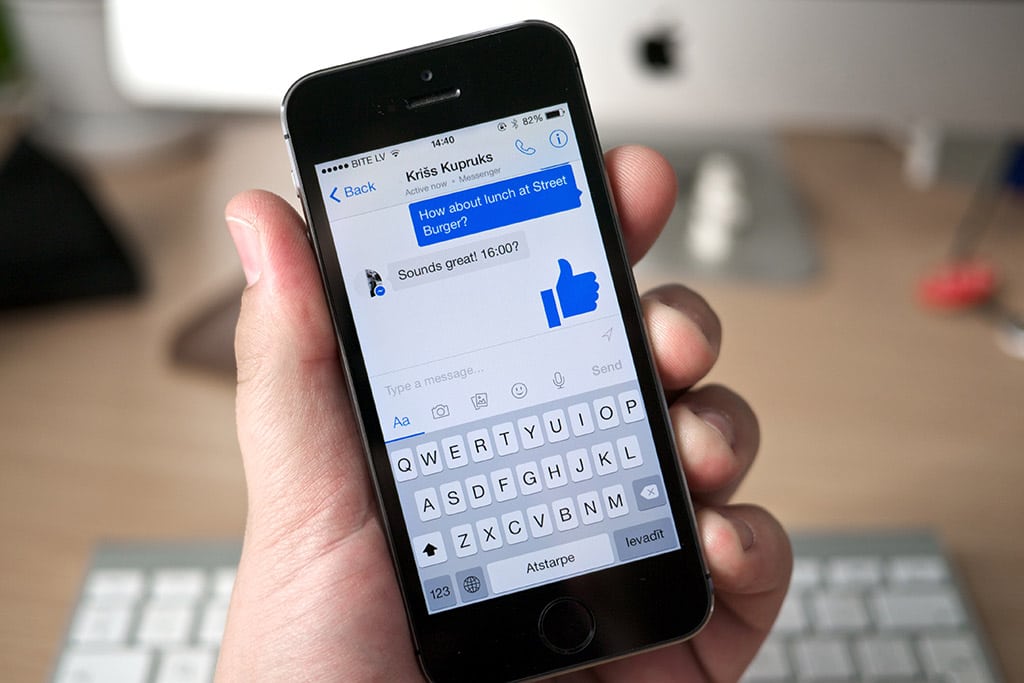Skift Take
The past year was one when consumers in the U.S. began communicating with major brands via messaging apps more intuitively, travel being no exception. But the time and money it takes to test and invest in this complicated technology is significant and 2017 will likely involve more testing and learning for brands before they fully understand what most travelers want when they open a messaging app and rattle off a question.
There’s little doubt that travelers’ use of messaging platforms around the world grew throughout 2016 — whether it’s Facebook Messenger, Skype, WhatsApp, WeChat, or another service.
What is uncertain is whether travel brands have kept pace and adopted messaging as aggressively as many have trumpeted. Part of this dilemma involves brands still figuring out their general social media strategies and how to have a presence on various platforms such as Facebook and Twitter.
Along with that, one question that’s plagued parts of the travel industry during the past year — hotels, in particular — is: Are messaging apps actually strategic for our brand?
There’s plenty of discord in brands’ responses, with hotels such as Marriott and Hilton investing in messaging in the hotels’ native apps for better customer relationship management. InterContinental Hotels Group (IHG) and Hyatt, for example, say they’re on platforms like Facebook Messenger because they want to be where guests are (albeit, Marriott Rewards is active on Facebook Messenger as we highlight below).
Only a handful of major travel brands such as Expedia, Kayak, and Skyscanner have launched bots powered by artificial intelligence this year across Facebook Messenger and Skype. “I think at the end of 2016 you would expect every hotel to have a Facebook presence and be responsive to guests but there are still debates about this,” said Benji Greenberg, founder and CEO of BCV, a social media solutions provider for hospitality brands that also helps brands with their messaging strategies.
One big twist is that this is more about markets than it is about brands, and the U.S. is behind.
As this debate swirls, brands in China, including IHG, have used WeChat for years because “it’s much more than an instant messaging platform,” said Emily Chang, IHG’s chief commercial officer for Greater China. Using WeChat, travelers can book hotels, trains and flights in one click with their WeChat Wallets, the platform’s digital wallet. The can also pay utility bills and order taxis, for example, in the same app.
Many western brands are playing catch-up to something that IHG and other travel brands in China have been offering for the past four to five years. But much of that is likely because WeChat is designed mainly for Chinese consumers and there isn’t an equivalent western rival that’s as all-encompassing that has gained traction with consumers.
Still, there are lessons western brands can glean from WeChat and how IHG’s brands — and Marriott, too — use it in China. “I always tell my colleagues that there is no such thing as digital marketing because we are marketing in a digital world,” said Chang. “WeChat is not just about targeting. If you ask a consumer ‘what would you like?’ they’ll tell you ‘A, B and C.’ But if you understand their desires you can engage on an entirely different emotional level. That’s what WeChat allows us to do.”
Chang said some 55 percent of WeChat users open and use WeChat more than 10 times per day. It’s that kind of engagement that helps facilitate a two-way dialogue between travelers and brands on WeChat, meaning that IHG can initiate a conversation instead of waiting for travelers to make a query.
Last year IHG’s Holiday Inn brand ran its “An Extra Day” campaign and reached out to Chinese travelers on WeChat to ask “what would you do if you had an extra day on a business trip?” Hotel Indigo, a boutique IHG brand with five properties in China, used WeChat last summer to let Chinese travelers know that musicians would be coming to select properties for live recordings and the brand received more than 900,000 interactions and messages as a result.
With both of these campaigns and other customer service messaging that IHG brands use on WeChat, it’s all about tone, said Chang. “Something I’ve noticed about American companies and their approach to messaging is that they tend to have very corporate tones on messaging platforms, not social tones,” she said. “When IHG brands use WeChat the conversations have a social tone to them. If you receive an auto reply right after sending a message, the brand is already using corporate language.”
Singapore’s Changi Airport, one of the world’s busiest and best that’s been awarded for its social media, has used WeChat since 2015 to communicate with travelers. “This year, we will continue to run campaigns and contests to attract followers, while developing interesting content which features the latest events and deals at the airport,” a spokesperson for Changi Airport told Skift. “We will also adopt WeChat functions to better serve our passengers, such as targeted messages useful and relevant to specific groups.”
Messaging Apps By The Numbers
Like IHG and Changi Airport, remaining relevant is always top-of-mind and with nearly one billion users on Facebook Messenger and another billion on WhatsApp, for example, these are platforms that brands operating in the U.S. can’t ignore in the long-run.
A Facebook-commissioned Nielsen study released this month found 63 percent of respondents said they’ve increased their messaging with businesses through messaging mobile apps during the past two years (the 12,500 respondents in 14 markets said they’d used a mobile messaging app during the past 30 days in March 2016 but weren’t all travelers). Facebook Messenger users exchange more than one billion messages with businesses per month on average, according to Facebook data.
Travel recommendations are also some of the top recommendations U.S. consumers would like to receive from chat bots, according to a survey conducted in November by DigitasLBI and Harris Poll that polled more than 2,000 U.S. internet users ages 18 and older.
Recommendations U.S. Internet Users Would Like to Receive From Chat Bots, November 2016
| Type of Recommendation | Percent of Respondents |
|---|---|
| Retail stores | 22% |
| Hotels/accomodations | 20% |
| Travel destinations | 18% |
| Pharmaceutical products | 12% |
| Fashion | 9% |
Source: DigitasLBI and Harris Poll
More than 33,000 business bots have launched on Facebook Messenger since Facebook released its developers platform for bots in April 2016. Microsoft also entered the bots fray back in March with Skype but so far only about 60 bots from multiple verticals are available on the platform including bots for Skyscanner, Hipmunk, and Expedia, the latter launching this past week. Expedia also said it’s working on the first travel product for Cortana, Microsoft’s virtual assistant.
A spokesperson for Facebook Messenger told Skift the company isn’t sure what percentage of its bots are travel related but here’s a list of some of the major travel brand bots that have launched so far.
Since Skift made a list of travel brand bots in June there haven’t been many additions. Most major travel brands, such as the TSA, and many individual hotel properties have a presence on Facebook Messenger where staff are messaging with travelers instead of bots.
At least four airlines, however, have added bots to Facebook Messenger — British Airways, Aeromexico, Lufthansa, and Icelandair.
Below we look at how various brands have approached bots and messaging platforms this year, how travelers have been responding and what the new year holds for artificial intelligence.
How Travelers Have Been Using Bots
Greenberg said BCV has about 160 hotel clients at the property level including the Four Seasons Dallas, Hyatt Regency New Orleans, Fontainebleau Miami Beach, and InterContinental Chicago and works with them to develop their messaging technology and strategies.
 So far, at least, he estimates about 98 percent of his clients don’t have bots but do have humans, in the form of hotel staff, available to respond to guests’ messages. “The heart of the customer service stuff, like early check-in, is really Twitter and Facebook Messenger for our clients,” said Greenberg. “Facebook Messenger is really starting to take the lead everywhere.”
So far, at least, he estimates about 98 percent of his clients don’t have bots but do have humans, in the form of hotel staff, available to respond to guests’ messages. “The heart of the customer service stuff, like early check-in, is really Twitter and Facebook Messenger for our clients,” said Greenberg. “Facebook Messenger is really starting to take the lead everywhere.”
Greenberg said his hotel clients have had about 1.1 million interactions with guests on messaging platforms this year. “The types of service requests that show up, they aren’t necessarily cut and dry,” he said. “They tend to be things like, ‘can I get a late check out?’ or ‘can I check in a few hours early?’ We’re also getting a lot of requests for recommendations for what to do. Guests want to be able to access that in real-time.”
messaging platforms this year. “The types of service requests that show up, they aren’t necessarily cut and dry,” he said. “They tend to be things like, ‘can I get a late check out?’ or ‘can I check in a few hours early?’ We’re also getting a lot of requests for recommendations for what to do. Guests want to be able to access that in real-time.”
BCV shared two examples of (non-bot) Facebook Messenger conversations from two of its clients during the past month, pictured here. In both examples, the guest used messaging to reach the hotel but was asked for an email address to help solve the problem.
Travelers turn to messaging platforms to for answers but most brands aren’t yet at the point of solving a problem or fulfilling a request entirely on these platforms. “The problem with the app world for properties and brands is that the onus is on the guest,” said Greenberg. “It’s on guests to input their information and fit into defined boxes. Sure, guests will order a cheeseburger through the hotel’s app but they’ll message the hotel on Facebook to find out why it’s late.”
Many hotels still prefer to keep all guest communication within their own native apps to help retain data and build guest profiles. Social data, however, is also rich for hotels too if they mine it effectively and travelers put enough of their personal information on their various profiles that brands could learn from.
Marriott Rewards’ Approach to Bots
 Marriott Rewards is one of the only major hospitality loyalty programs with a Facebook Messenger bot — and also one of the only major hotels engaging with guests in such a way. Wyndham Rewards and Hilton HHonors, for instance, are also on Messenger but not with bots.
Marriott Rewards is one of the only major hospitality loyalty programs with a Facebook Messenger bot — and also one of the only major hotels engaging with guests in such a way. Wyndham Rewards and Hilton HHonors, for instance, are also on Messenger but not with bots.
Marriott’s approach to messaging is interesting in that it’s choosing to use artificial intelligence to help its guests and millions of loyalty program members with one of the biggest travel questions of the year: What will happen to their points now that Starwood and Marriott have officially merged? 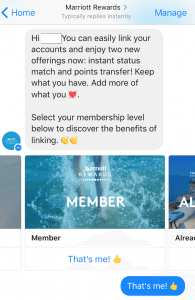
Marriott Rewards’ Messenger bot helps answer that question and only that question depending on the status level of guests part of the Marriott Rewards of SPG Preferred Guest programs. If someone has a more detailed or unrelated question they need to choose “Customer Care” to chat with a customer service representative. We’ve included screenshots from a recent conversation we had with the bot that included a glance at some FAQs about the Starwood merger.
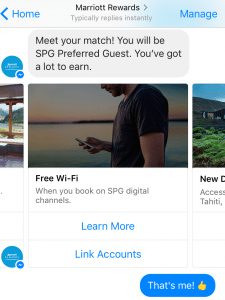 Given that loyalty programs are often the most lucrative guest segments for hotels and that Marriott International’s only company-wide Messenger bot deals exclusively with its loyalty program is certainly indicative of how even more important the program is after the merger and also how it sees its guests using messaging in the future.
Given that loyalty programs are often the most lucrative guest segments for hotels and that Marriott International’s only company-wide Messenger bot deals exclusively with its loyalty program is certainly indicative of how even more important the program is after the merger and also how it sees its guests using messaging in the future.
‘Blurred Line’ With Messaging Platforms?
Do most travelers understand when they’re communicating with a computer, i.e. artificial intelligence, and when they’re talking to a human on messaging apps?
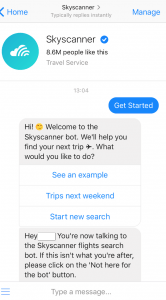 Most likely, and some brands such as Skyscanner make this very clear at the beginning of conversations.
Most likely, and some brands such as Skyscanner make this very clear at the beginning of conversations.
With Skyscanner, travelers search for the brand in Facebook Messenger and are greeted with a message that tells them Skyscanner is “not a travel agency” and let’s them choose whether they want to message the bot or contact a human customer service representative.
If travelers go the human route, they’re told “someone in our team will be in touch within 24 hours (Monday to Friday),” which isn’t swift or always the most convenient time frame.
Icelandair also recognizes that sometimes humans are the best problem solvers (see example here). 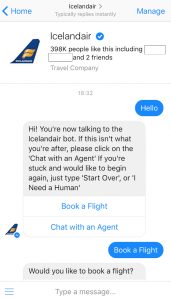
Travelers that message Aeromexico on Facebook Messenger aren’t explicitly told they’re chatting with a bot but are told “if you prefer to chat with an agent, just type ‘Help’.” Similarly, British Airways’ Messenger bot doesn’t introduce itself as such as it promotes destinations part of a sale by asking travelers to respond to questions with emojis.
Greenberg feels there’s a blurred line between messaging, chat bots and the platforms themselves. Sometimes travelers message brands outside of actual messaging platforms. “Volume is a bit of a two-way street,” he said. “Someone who comments on a Facebook post that a hotel did might choose to interact with that hotel on that Facebook post. You might go back and forth many times and it’s a public conversation but it is a message. A lot of these public conversations also tend to spark private conversations in Facebook Messenger.”
What’s Next For Facebook Messenger and Travel Brands?
Last year was one when many travel brands definitely made progress with their mobile messaging strategies.
But was messaging as transformational or as ingrained in consumers’ daily lives as many brands had said it would be? Probably not, at least concerning consumers communicating with brands via messaging platforms. There are still only a handful of travel bots and most aren’t any more helpful than if a traveler booked a trip online themselves or called customer service to fix a problem.
At least with major travel brands that have a presence on Facebook Messenger, many say that travelers can typically expect responses in a few hours to even a day or two later — not exactly helpful for a mobile environment when travelers often look for answers on-the-go.
Still, brands shouldn’t feel too guilty. Facebook CEO Mark Zuckerberg told analysts and investors during the company’s third quarter earnings call on November 2 that “Messenger is still early in the second phase.” The second phase of building out Messenger is about enabling people to organically interact with businesses, according to Zuckerberg.
Zuckerberg did say, though, that the next phase (Phase 3) of Messenger involves brands offering more levels of personalization to consumers such as special offers and personalized deals that they only get through messaging a brand. If that ends up playing out then British Airways’ bot, as one case, could already be considered an early mover as it’s technically offering travelers personalized deals by having a conversation driven by emojis that yields results that seem more tailored than what most other travel brands are doing with bots.
ARTIFICIAL INTELLIGENCE AND MESSAGING IN 2017
To be clear, brands have only scratched the surface of what a platform like Facebook Messenger offers and most haven’t yet dabbled in newer features like video or voice calls.
For another thing, messaging platforms and how guests want to use them to talk to hotels, for example, is likely better understood at the property level than in corporate offices. “If you go down to the property level, like the GM of a conference hotel with more than 1,000 rooms, they get it,” said Greenberg. “They know that every moment of every day somebody is saying something and they need a way to hear what that is and act on it. I think those individuals have pushed a little bit to make sure that their hotels are covered from a social customer care standpoint. But that’s at the hotel level.”
Expedia CEO Dara Khosrowshahi, speaking at Skift Global Forum in September, promised that Expedia is working hard on its artificial intelligence capabilities but mused that “I think the planning experience and build for AI [artificial intelligence] has a real challenge because you are going to get a lot of null results. The AI isn’t going to understand what you say.”
Although many of the travel brands with bots are helping travelers plan trips.
Khosrowshahi said he plans to take AI to the customer service side to help travelers cancel a hotel booking, for example, and Expedia has so far stuck to that game plan between its Facebook Messenger and Skype bots.
None of this is to say artificial intelligence won’t see wider adoption with travel brands in 2017. The time and money it takes to test and invest in this complicated technology is significant and next year will likely involve more testing and learning for brands before they fully understand what most travelers want when they open a messaging app and rattle off a question.
Skift AI Travel Newsletter
AI coverage across travel sectors that’s focused on separating trendy moves from good ideas – in your inbox every Friday.
Have a confidential tip for Skift? Get in touch
Tags: artificial intelligence, facebook, messaging
Photo credit: Some travel brands made strides with messaging last year while most others have a long way to go if they expect to meet consumers' expectations. Karlis Dambrans / Flickr
